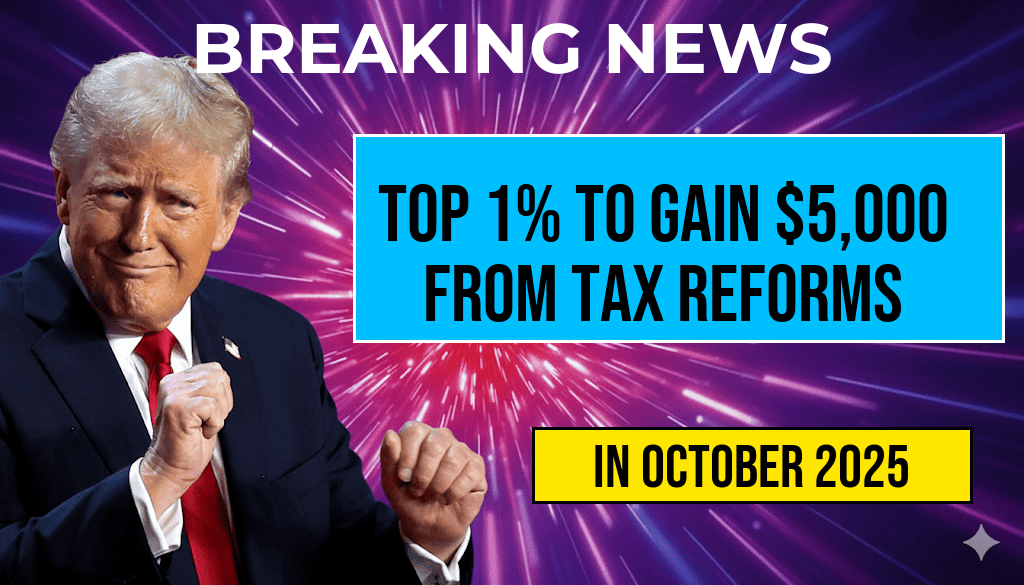Under recent tax reforms enacted by Congress, the wealthiest Americans in the top 1% are projected to see an average increase of approximately $5,000 in their annual net income. This adjustment stems from changes aimed at simplifying tax brackets and reducing certain levies on high-income earners. While proponents argue that these reforms promote economic growth and incentivize investment, critics contend they may widen income disparities. The updated policies, which took effect at the start of the fiscal year, are expected to benefit roughly 1.3 million households classified within the highest income tier, according to the U.S. Census Bureau. As the debate over tax fairness continues, understanding the specific mechanisms behind these changes offers insight into their potential economic and social implications.
Details of the Tax Reforms and Their Impact on High-Income Households
Key Changes in Tax Policy
- Adjustment of Tax Brackets: The IRS increased the income thresholds for the highest tax brackets, effectively lowering the marginal tax rate for some high earners.
- Reduction of Capital Gains Taxes: The reform includes a modest decrease in capital gains taxes for assets held over longer periods, which predominantly benefits wealthy investors.
- Enhanced Deductions and Credits: Certain deductions favored by high-income taxpayers, such as itemized deductions, were expanded or preserved, further reducing taxable income.
Projected Financial Benefits
| Income Group | Average Net Income Increase | Number of Households Affected |
|---|---|---|
| Top 1% | $5,000 | Approximately 1.3 million |
| Top 0.1% | $15,000 | Estimated 150,000 households |
Economic and Social Implications
Potential for Increased Investment
Experts suggest that additional disposable income among the wealthiest could lead to increased investment in stocks, real estate, and entrepreneurial ventures. Such activity might stimulate economic growth, create jobs, and foster innovation. However, critics warn that this redistribution favors the already affluent, potentially exacerbating wealth inequality and limiting the benefits for lower-income communities.
Tax Revenue and Public Spending
While the reforms aim to promote economic expansion, they also result in a slight decrease in federal tax revenue from high-income households. Economic analysts estimate a reduction of approximately $45 billion annually, which could influence government spending priorities, including social programs and public infrastructure investments. Advocates for the reforms argue that increased economic activity will offset the short-term revenue loss, though skeptics question this assumption.
Political and Policy Perspectives
The legislation has ignited debate among policymakers, with some viewing it as a necessary step toward fostering a competitive economy, while others criticize it for undermining fiscal equity. The Biden administration expressed concerns that the reforms favor the wealthy disproportionately, whereas proponents cite the potential for job creation and economic dynamism. The ongoing discussion underscores the complex trade-offs inherent in tax policy design.
Historical Context and Future Outlook
Historically, tax reforms aimed at high-income earners have fluctuated between periods of increased taxation and tax cuts. The current adjustments follow a trend of favoring lower marginal rates for top earners, aligning with broader economic strategies that prioritize growth over redistribution. Looking ahead, analysts anticipate that further legislative proposals could modify these policies, especially as electoral politics influence fiscal priorities. Monitoring the actualized effects over the coming year will be crucial in assessing their long-term impact on income distribution and economic health.
For more detailed analysis on recent tax legislation, visit Forbes or consult the Wikipedia page on U.S. tax reform.
Frequently Asked Questions
What is the main impact of the recent tax reforms on the wealthiest Americans?
The recent tax reforms are set to increase the net income of the top 1% of Americans by approximately $5,000.
Which income group will benefit the most from these tax changes?
The wealthiest Americans in the top 1% are projected to benefit the most, experiencing a notable boost in their net income due to the reforms.
How will the $5,000 increase in net income affect high-net-worth individuals?
The $5,000 increase will enhance the financial position of high-net-worth individuals, potentially enabling more investment and spending.
Are these tax reforms permanent or temporary?
The article suggests that these tax reforms will have a lasting impact, but specific details on their duration are not provided.
What are the broader implications of this income increase for the economy?
The increase in net income for the top 1% could lead to higher investment and economic growth, but may also raise discussions about income inequality.

Leave a Reply